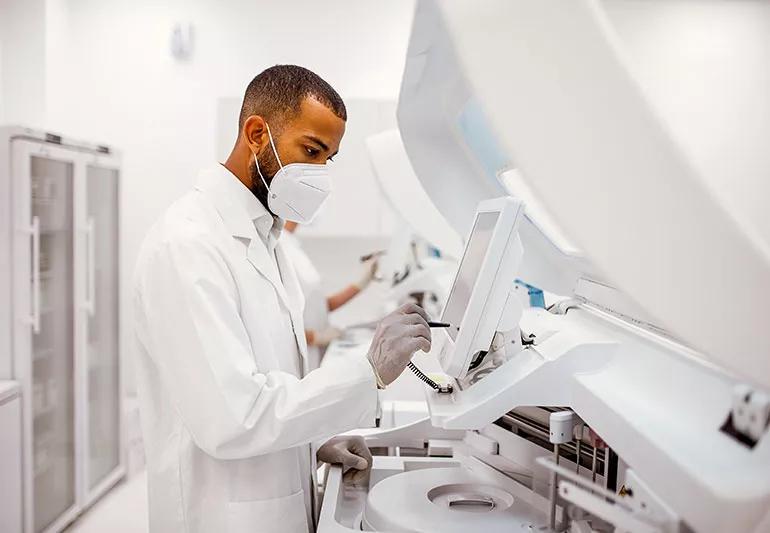Biomarker testing tells doctors how to target their treatments

Cancer is a complex condition to treat. Some people respond to certain treatments better than others, and so much of your treatment is dependent on when you’ve been diagnosed, where your cancer originated from and how far your cancer has spread.
Advertisement
Cleveland Clinic is a non-profit academic medical center. Advertising on our site helps support our mission. We do not endorse non-Cleveland Clinic products or services. Policy
When we start talking about rare or aggressive cancers like cholangiocarcinoma (bile duct cancer), that’s especially true — there’s still a lot we don’t know, and navigating misinformationcan be hard.
But with the help of molecular profiling (also known as biomarker testing), as well as ongoing research and clinical trials, discovering the right treatment for you is becoming easier.
Oncologist Suneel Kamath, MD, explains just how molecular profiling works and why you may want to consider participating in a clinical trial.
The cells in your body are distinctly different from one another depending on the type of cells they are. Your kidney cells are made up of different molecules than your skin cells. Your blood cells are different from your brain cells, and so on. These differences also occur in cancer cells, and each cancer type will have different configurations from another cancer. This is how doctors are able to tell that cholangiocarcinoma is different from liver cancer even when bile duct cancer cells are located inside of your liver.
“Liver cancer starts from actual liver cells, called hepatocytes,” says Dr. Kamath. “Cholangiocarcinoma is a cancer that comes from bile duct cells, and these cells are present in the exact same organ as liver cancer cells. They’re right next to each other on a microscopic scale.”
Advertisement
There are distinct molecules, called biomarkers (or biological markers), that set each cell apart from another. These biomarkers can be measured in tissue, blood and other bodily fluids through the process of molecular profiling (also known as biomarker testing or genomic sequencing). For molecular profiling to work, doctors have to take samples from the site of your tumor, or cancer origin. This is often done with a biopsy. Doctors can do this when determining your initial diagnosis through a tissue biopsy. Or they can do a liquid biopsy (blood test) to measure for something called cell-free DNA, or circulating tumor DNA. This is the DNA that’s shed into your bloodstream by the cancer. This type of testing can be done for several different types of cancers.
There are three classes of biomarkers, and each class tells doctors different information about the cancer they’re researching:
“Biomarker testing is a strategy for us to look for something that is potentially targetable beyond our standard treatments like chemotherapy or immunotherapy, which is often given to all patients regardless of specific biomarkers,” says Dr. Kamath.
Everybody is different. For some people, chemotherapy might be really effective. For others, a combination of chemotherapy and immunotherapy will work better. And for others, targeted therapies are designed to target specific genetic mutations present in cancerous cells with the goal of reducing harm to other healthy cells in your body.
About 30% of people who have cholangiocarcinoma have a known biomarker, which means about 30% of people with cholangiocarcinoma have a direct pathway toward a targeted treatment.
“For cholangiocarcinoma, there are quite a few gene targets that we’ve found over the years,” notes Dr. Kamath. “We’re looking for specific genetic or genomic targets. There are individual drugs that have been developed that can target those precise mutations.”
Currently, there are three U.S. Food and Drug (FDA)-approved targeted therapies for people who have NTRK, FGFR and infigratinib gene mutations. There are also three biomarkers that respond well to immunotherapy.
Advertisement
“The genetic mutation known as microsatellite instability (or MSI-H/dMMR) is really sensitive to immunotherapy,” explains Dr. Kamath. “That particular mutation or biomarker is present in only 1% to 2% of people with cholangiocarcinoma, but it is important for those people who have it. High tumor mutation burden (TMB) is another biomarker that could indicate more sensitivity to immunotherapy. PD-L1, which is a common biomarker for immunotherapy in other cancers, has less proven value as a biomarker in cholangiocarcinoma. And we’re learning more and more about other targets as time goes on.”
Of course, there’s a chance that you might not have any known biomarkers that signal to doctors which treatment will be most effective.
“If you don’t have any biomarkers, that doesn’t automatically mean you’re going to do worse,” states Dr. Kamath. “If we don’t have a drug that’s specific to a gene that works really well, then it’s possible the outcomes might not be as good. But not having a biomarker doesn’t necessarily mean the tumor is any more aggressive or there aren’t any treatment options. In those cases, we would use standard treatment options like chemotherapy, immunotherapy or a combination of both.”
Advertisement
No matter the outcome, participating in molecular profiling or biomarker testing is crucial to understanding your own diagnosis and what’s possible. With each test that’s done, doctors are continuing to learn more about the nature of cancer, how it’s spread and how to stop it from spreading.
“If people are interested in making sure they’re leaving no stone unturned, biomarker testing is really important because we never find anything that we don’t look for,” says Dr. Kamath.
One thing you may want to consider, especially if you have specific biomarkers, is the option to participate in a clinical trial where doctors can treat you with novel, cutting-edge therapies that could have better outcomes than existing drugs.
And if you’re worried about participating in a study that gives some people placebos or no treatment at all, you don’t have to worry when participating in a cancer clinical trial: Everybody participating in a cancer clinical trial is provided at least the standard treatments they would have received had they not joined the trial in the first place. And many will also get a novel clinical trial drug that could be more effective against their cancer.
“All of these drugs take several years from when they’re first produced or identified to become FDA-approved,” says Dr. Kamath. “A clinical trial is a way to get access to those treatments before other people would be able to. A lot of times, those tend to be significantly more effective than existing standard treatments.”
Advertisement
Dr. Kamath is currently piloting a clinical trial that’s investigating the effectiveness of a specific drug that targets FGFR2 in patients with cholangiocarcinoma and other tumors. FGFR2 is a specific gene that belongs to the FGFR family. Current FDA-approved drugs target the entire FGFR family, which can lead to unnecessary side effects. But if Dr. Kamath’s clinical trial is successful, it could shed light on a new, potentially more effective targeted therapy for people who have the specific FGFR2 mutation — roughly 10% to 15% of people who have cholangiocarcinoma.
“I would encourage anyone with cholangiocarcinoma to get biomarker testing to help personalize their care for their specific condition,” says Dr. Kamath.
Learn more about our editorial process.
Advertisement

You may experience fatigue, weight loss, nausea and diarrhea, but exercise and medication can help

There are many options, including surgery or medication

Rely on trusted information from hospital systems, medical nonprofits or your oncologist

A decreased appetite can cause weight loss, so opt for smaller meals and full-fat foods

Thoughts and feelings can change over time; relaxation, self-care and support groups can help

Research consistently shows that soy-based foods do not increase your risk of breast cancer

Lung cancer and treatment can take its toll, but support is available to help you live well

Getting your treatment plan just right can take some fine-tuning, but the appointments will taper off

The tropical fruit is a good source of antioxidants and vitamin C

Most people fall asleep within 10 to 20 minutes, but if your experience is different, adjusting your sleep schedule may help

Exploring your hidden side can lead to better understanding of what makes you tick